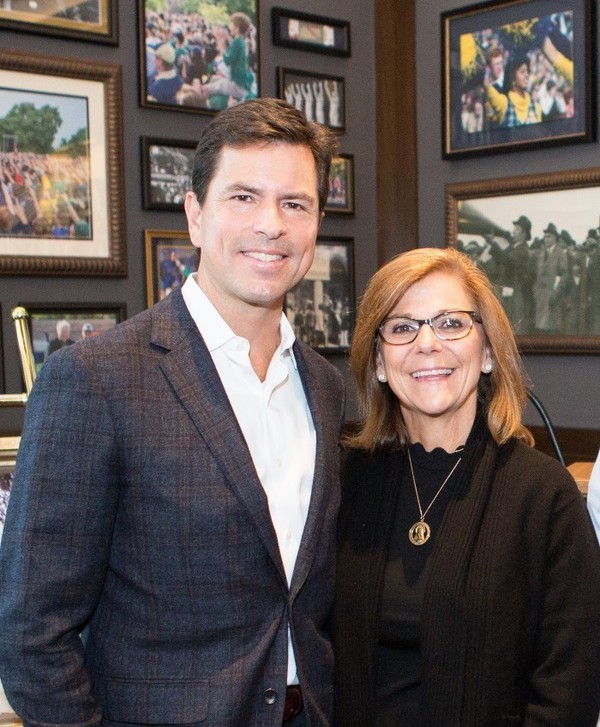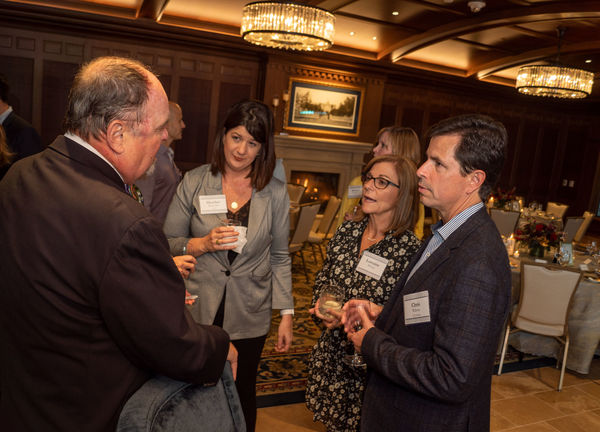
By Erin Swope (ND '22), Undergraduate Marketing & Communications Assistant
When presented with the opportunity to invest in an organization, some donors immediately feel a connection. Such was the case with Chris and Lorraine (Sheehan) Wilson who, through their family’s Wilson Sheehan Foundation, are two of LEO’s most involved and devoted donors.
When the Wilsons were looking to make a financial gift to Notre Dame in late 2012, the University presented them with a few different opportunities. One of those was a brand-new lab within the Department of Economics with an aim to use rigorous research and partnerships with social service organizations across the country to identify what works to reduce poverty in America.
It was a perfect match. “LEO just jumped off the page,” Chris (ND ’85) recalls. “I said, ‘This is exactly what we’re looking for,’ because it meshed with why we formed the foundation in the first place. We wanted to be most effective with our resources and that’s exactly what LEO was looking to do.”
Chris, a partner at the small private equity firm Stonehill Capital, gets right to the heart of his family foundation’s mission. “For us, the priority is people who lack opportunity. Our goal is to provide them greater opportunity, to introduce them to pathways that improve their lives. I guess that gets back to our Catholic faith—it’s people-centered.”
Lorraine (SMC ‘85) makes it easy to see why LEO and the Wilson Sheehan Foundation are such a fit. “Within that realm we wanted to focus on making a fundamental impact. We wanted to address the root causes—why are people ending up in poverty and how can we prevent it from happening in the first place?”
These ideas had been on Chris and Lorraine’s minds for years. After their three children graduated from high school and joined the ranks of Notre Dame students themselves, the Wilsons looked at their financial situation and saw that they had the ability to give back.
“We wanted to be deliberate about how we purposed that money,” says Chris. “We created our family foundation to manage it well, manage it professionally, and allocate resources where they were going to do the most good.”
According to Lorraine, this desire to give back was nurtured at Notre Dame where the couple met.
“Notre Dame is where he developed who he was going to be for the rest of his life,” Lorraine says of Chris. “The people he met there made him think about the importance of giving back to your community and serving your community. That was always emphasized at Notre Dame.”
At the time the Wilsons created their foundation, Lorraine, who had left her career in accounting to raise their three children, was looking for a new purpose now that they were empty nesters. The foundation turned into a real family effort, with Lorraine’s sister Maureen Sheehan Massaro coming on board as executive director.
The partnership between LEO and the Wilson family has been a fruitful one. For the Wilsons, it has helped them find organizations they might want to help grow. As LEO has introduced the foundation to its service provider partners, the Wilsons have come to better understand issues that their other grantees grapple with. They’ve been able to delve into new passions, too. When Lorraine wanted to learn more about issues surrounding foster care, LEO’s managing director Heather Reynolds and associate director Katie Kuka invited her behind the scenes of the foster care cohort that LEO was planning.
“It has developed into a way more in-depth relationship than I had expected when we first funded LEO,” Lorraine says.
LEO also benefits from the relationship—beyond the obvious boon of the financial support the Wilsons provide. Chris and Lorraine are involved at a personal level, applying their passion and business expertise to some of LEO’s organizational goals. For instance, Chris is a board director and leads a smaller task force to develop LEO’s long-term strategy. When new partners reach the end of the 16-week research design process with the LEO team and present their projects to an audience of stakeholders, Lorraine is usually in attendance—to learn, ask questions, and make connections. Maureen Massaro is involved in shaping LEO’s work to get research results into the hands of people who can put them to use.

Chris describes his family’s relationship with LEO as a two-way street. “Hopefully I can add some value. I have my own skills and knowledge that I can bring to the table. But I also learn a lot from it and it helps me be a better person. I take what I learn from LEO to other things I’m involved in. I’ve always wanted to be a lifelong learner and you learn in multiple ways. Being there at the table and paying attention and giving your time is how you do it.”
LEO is a natural fit with the work of the Wilson Sheehan Foundation, but Chris is also quick to acknowledge how LEO fits within the larger mission of the University. “It meshes with Notre Dame’s mission so well—the Catholic social teaching with holistic formation. It’s great for the world what LEO is doing, but it’s also great for Notre Dame.”
The Wilsons look forward to the future and seeing the good that their investment in LEO’s work will have. They understand the difficulties of ending poverty. But they have hope.
“You see the power of compounding in business,” Chris explains. “An idea can start small and, by adding other people into it and growing on itself, it can have a hundredfold impact over time. I see no reason why that can’t be true for LEO.” It’s this unapologetic belief in the potential of small starts that makes Chris such an advocate for LEO’s growth. “I think we just keep expanding the number of academics doing the work, the number of programs we’re evaluating, and the dissemination. That’s what you have to do to have an impact on poverty. Poverty is a big problem, so it demands a big solution.”
The Wilsons don’t see their partnership with LEO and the other organizations they support ending anytime soon. Even the possibility of retirement does not pose much of an obstacle.
“I think Chris’s work in the philanthropy world is going to be his second career after retirement someday,” Lorraine says with a laugh. “Becoming active in LEO and some of the other areas we support is how he is going to devote the second part of his life.”
Part of the Wilson’s dedication to LEO stems from their view that the lab is a critical part of eradicating poverty. “There are wonderful service providers doing great things,” they agree. “The government is honestly trying to do the right things. And yet, very few of their efforts are measured for effectiveness. If we could devote resources into the things that are proven to work, the whole system works better and you can actually end poverty. It sounds audacious to say it, but a country like ours, I think, can. It’s just a matter of being smarter about how we do it, and LEO is an important part of the tools to get that done.”